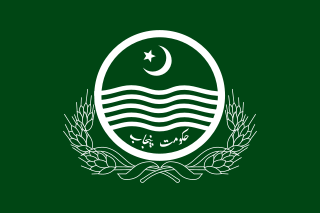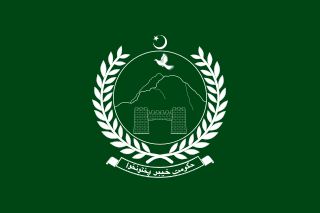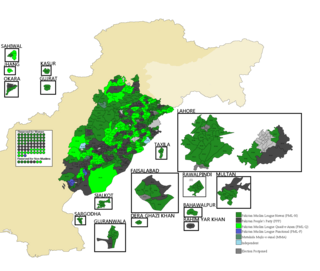Family and personal life
| | This section is empty. You can help by adding to it. (August 2013) |
Chetan Mal Arwani (born 1 March 1967) is a Pakistani Hindu politician. [1] A member of the Pakistan Muslim League (Q), he holds a seat reserved for non-Muslims in the Provincial Assembly of Sindh.
| | This section is empty. You can help by adding to it. (August 2013) |
| | This section is empty. You can help by adding to it. (August 2013) |

Since its establishment in 1947, Pakistan has had an asymmetric federal government and is a federal parliamentary democratic republic. At the national level, the people of Pakistan elect a bicameral legislature, the Parliament of Pakistan. The parliament consists of a lower house called the National Assembly, which is elected directly, and an upper house called the Senate, whose members are chosen by elected provincial legislators. The head of government, the Prime Minister, is elected by the majority members of the National Assembly and the head of state, the President, is elected by the Electoral College, which consists of both houses of Parliament together with the four provincial assemblies. In addition to the national parliament and the provincial assemblies, Pakistan also has more than five thousand elected local governments.

The Constituent Assembly of India was elected to frame the Constitution of India. It was elected by the 'Provincial Assembly'. Following India's independence from the British rule in 1947, its members served as the nation's first Parliament as the 'Provisional Parliament of India'.

East Bengal was a non-contiguous province of the Dominion of Pakistan. Geographically part of the Bengal region, East Bengal existed from 1947 until 1955, when it was renamed East Pakistan. Today, the area is an independent country, Bangladesh. With its coastline on the Bay of Bengal, it bordered India and Burma. It was located close to, but did not share a border with, Nepal, Tibet, the Kingdom of Bhutan and the Kingdom of Sikkim. Its capital was Dacca, now known as Dhaka.

The Provincial Assembly of the Punjab is a unicameral legislature of elected representatives of the Pakistani province of Punjab, which is located in Lahore, the provincial capital. It was established under Article 106 of the Constitution of Pakistan, having a total of 371 seats, with 297 general seats, 66 seats reserved for women and 8 reserved for non-Muslims. The 17th Provincial Assembly of the Punjab was dissolved prematurely on 14 January 2023. The date of next elections in Punjab is being highly contested legally. The Constitution of Pakistan requires that new elections for the Punjab Assembly must be held within 90 days from the date of dissolution under Article 224(3)(a). Therefore, by law, new elections for the Punjab Assembly must have been held by 14 April 2023. However, the Election Commission of Pakistan had unilaterally announced that the province was set to elect a new legislature on 14 May 2023. After that date's passing, it is unclear when provincial elections will be held.

The East Pakistan Provincial Assembly, known as the East Bengal Legislative Assembly between 1947 and 1955, was the provincial legislature of East Pakistan between 1947 and 1971. It was known as the East Bengal Assembly from 1947 to 1955 when the provincial name was changed. The legislature was a successor to the Bengal Legislative Council and the Bengal Legislative Assembly, which were divided between East Bengal and West Bengal during the partition of Bengal in 1947. It was the largest provincial legislature in Pakistan. Elections were held only twice in 1954 and 1970.
Sardar Muhammad Yaqoob Khan Nasar is a Pakistani politician and current Member of the Senate of Pakistan. He was the Interim president of the Pakistan Muslim League (N) in 2017. He succeeded Nawaz Sharif after his disqualification by the Supreme Court of Pakistan.
Arbab Ghulam Rahim is a Pakistani politician who served as the Chief Minister of the Government of Sindh from 2004 until 2007.

The Provincial Assembly ofKhyber Pakhtunkhwa is a unicameral legislature of elected representatives of the Pakistani province of Khyber Pakhtunkhwa, which is located in Peshawar, the provincial capital. It was established under Article 106 of the Constitution of Pakistan, having a total of 145 seats, with 115 general seats, 26 seats reserved for women and 4 reserved for non-Muslims. The 11th Provincial Assembly of the Khyber Pakhtunkhwa was dissolved on 18 January 2023, and the province is set to elect a new legislature on 8 October 2023.

The Krishak Sramik Party was a major anti-feudal political party in the British Indian province of Bengal and later in the Dominion of Pakistan's East Bengal and East Pakistan provinces. It was founded in 1929 as the Nikhil Banga Praja Samiti to represent the interests of tenant farmers in Bengal's landed gentry estates. Sir Abdur Rahim was its first leader. A. K. Fazlul Huq was elected leader in 1935 when the former was appointed as the president of the Central Legislative Assembly of India. In 1936, it took the name of Krishak Praja Party and contested the 1937 election. The party formed the first government in the Bengal Legislative Assembly. After the partition of British India, it was reorganized as the Krishak Sramik Party to contest the 1954 election, as part of the United Front. The coalition won the election and formed the provincial government in the East Bengal Legislative Assembly.
The Constitution of 1962 was the fundamental law of Islamic Republic of Pakistan from 8 June 1962 until martial law was declared in 25th March 1969. It was abrogated on 25th March 1969 by President Yahya Khan.
Ram Singh Sodha was a former Pakistani Hindu politician. A member of the opposition Pakistan Muslim League (Q), he held a seat reserved for non-Muslims in the Provincial Assembly of Sindh, but in 2011 resigned and moved to India.

NA-87 Khushab-I consists of 2 National Assembly (NA) and 3 Punjab Provincial Assembly constituencies.

The Provincial Assembly of Balochistan is a unicameral legislature of elected representatives of the Pakistani province of Balochistan, and is located in Quetta, the provincial capital. It was established under Article 106 of the Constitution of Pakistan having a total of 65 seats, with 51 general seats, 11 seats reserved for women and 3 reserved for non-Muslims. The Assembly has 51 directly elected Members of the Provincial Assembly, representing constituencies from each district, as well as 11 seats reserved for women and 3 for non-Muslims.
Hari Ram is a Pakistani Hindu politician from Sindh. A five-time legilslator to the Provincial Assembly of Sindh, Ram was the first non-Muslim to win a non-reserved constituency in (West) Pakistan; he served in the Senate from 2012 to 2018.
Michael Javaid was a Christian politician and human rights activist from Sindh in Pakistan.

Provincial elections were held in the Pakistani province of Punjab to elect the 16th Provincial Assembly of the Punjab on 11 May 2013, alongside nationwide general elections and three other provincial elections in Sindh, Balochistan and Khyber Pakhtunkhwa. The remaining two territories of Pakistan, AJK and Gilgit-Baltistan, were ineligible to vote due to their disputed status.

The Thari also known as the Dhatki are an Indo-Aryan ethno-linguistic group who reside in the Thar Desert, which is divided between Pakistan as well as India. They speak Thari, also known as Dhatki language. The Thari live primarily in Tharparkar, a district of Sindh in Pakistan. In India, Thari speakers are found in parts of Rajasthan.

Provincial elections were held in the Pakistani province of Punjab on to elect the members of the 17th Provincial Assembly of the Punjab on 25 July 2018, alongside nationwide general elections and three other provincial elections in Sindh, Balochistan and Khyber Pakhtunkhwa. The remaining two territories of Pakistan, AJK and Gilgit-Baltistan, were ineligible to vote due to their disputed status.

Provincial elections were held in the Pakistani province of Punjab to elect the 15th Provincial Assembly of the Punjab on 18 February 2008, alongside nationwide general elections and three other provincial elections in Sindh, Balochistan and North-West Frontier Province. The remaining two territories of Pakistan, AJK and Gilgit-Baltistan, were ineligible to vote due to their disputed status.